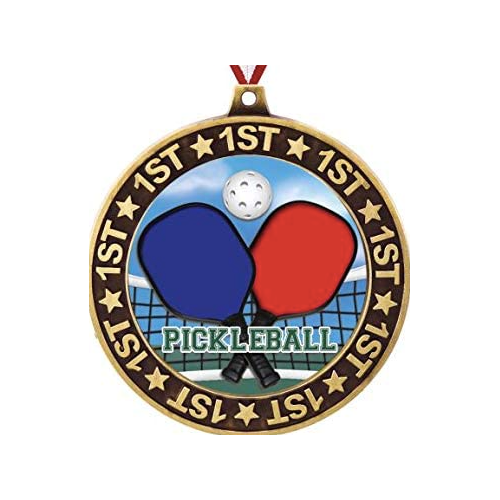Pickleball Gameplay Is Competitive Pickleball Right for You?
 Elena Arnold
Sep 30, 2022
Elena Arnold
Sep 30, 2022

…If you’re a recreational pickleball player, you may be wondering if you should step into the tournament scene. I get this question often from newer to intermediate players: “Should I enter a tournament?” If you’ve never played in a tournament before, you may not realize that all levels are welcome. So find a partner and sign up, but first let me give you some of the inside scoop to see if the tournament world is right for you. Here are some questions and concerns that I’ve heard from people pondering their entrance into the competitive pickleball world.
Am I ‘good enough’?
Many players think they have to be Matt Wright and Lucy Kovalova to enter a tournament, but brackets can range from beginners to pro. I’ve seen “novice tournaments” that have only VERY beginner players competing. Would I have entered a tournament at that point of my pickleball journey? Heck no! However, I give so much credit to those who do.
If you have not played competitively, self rate according to the USAPA Rating system. Be honest. In my personal opinion, it is better to play on the lower side for your first tournament rather than overestimating yourself. If you haven’t played in a rated tournament before and you are doing your best to self rate; no other players can accuse you of “sand bagging”. What is sand bagging? The blatantly honest answer: when you are a player who plays down to win a medal.
If you have entered a sanctioned tournament before, you are given a rating. If your rating is right between two levels, you get to decide which division to play. If you play the lower division, you may have a couple of challenging games, but will probably win most. If you enter the higher division, you will probably have MANY challenging games and maybe win a couple. Which is the right choice? That is such a personal answer. Are you playing to win or are you playing to compete at a challenging level? Now if you enter a tournament at a certain level and lose every game with a big gap in points, maybe it’s time to take a step back and reevaluate what division you should be playing in. Sometimes players get in a ‘funk’ and either need to take a break from competitive play, switch up partners, or try a different division.
How do I find a partner?
I’ve said before that my husband is my built in mixed doubles partner. We play so much together that I can’t imagine playing mixed doubles with anyone else. Do we play well together? YES. Do we win every game? NO. Even as a married couple who plays together a couple times a week, we miscommunicate sometimes on certain shots. Many people will not play with a spouse for that exact reason; the miscommunication on the court can hurt your communication off the court. What if you do not have a ‘built in’ partner or if you choose not to play with that partner? Where do you go to find another?
A friend recently started playing pickleball and wanted to try a tournament. However, this friend didn’t have a partner. He looked high and low and still no luck. He jokingly said that finding a tournament partner was the equivalent to connecting with a date on Tinder. He put it all out there on a Facebook page for a local pickleball community. He was honest and listed his approximate rating and how often he could meet up to practice for the tournament.
He found someone through “Pickleball Tinder” (not a thing, but someone should invent it!). He actually found a partner through his community Facebook page. How did the partnership pan out? I’ll get back to you on that one as the tournament is this weekend. What I do know is that it can be very challenging to play with someone who you do not play with often. When you find a solid partner- stick together! The more you play together, the more you will gel.
What if I let my partner down?
I have seen amazing pickleball players play with other top notch players, and they just do not mesh. You would think that two strong players would just dominate the court. What if both players want to be the “A” player and ball hog to the point of disrupting each other? What if both players are used to be the “B” player and playing passively makes you lose points?
Just as in any team sport, you need to be able to rely on your teammates. If you know your partner is in his/her head over not playing as well as he/she would like- pep them up. Try some positive reinforcement to know you aren’t upset about your teammate’s performance. Even if you are disappointed, that won’t get you anywhere. You can’t get previous shots back, you can only do better moving forward.
One close friend who I play with often said she gets so nervous before a tournament that she can’t sleep the night before. She feels as if this nervousness projects onto her partner and they don’t play well. Some level of nerves are good, but if you are unable to eat or sleep before a tournament then maybe they are NOT for you. You never know until you try to play in one, though. I get slightly nervous, but that usually fades away by the end of the first match and then it is game ON.
Do your best and be a positive teammate and it will be hard to let your partner down. If you make mistakes- guess what? So does everyone else. Try to minimize the unforced errors and treat every point as a new opportunity to win the point (or get the side out).
What if the courts are different from what I’m used to?
I played in an indoor tournament earlier this month and another player told me she couldn’t get used to it because she only plays outdoors. I felt the exact opposite way; I enjoy playing outdoors, but our court availability is limited and wait time for games is long. Oftentimes, I will skip the wait and play indoors where I know I will get many games in during the hour or so that I have to play. When I did enter an outdoor tournament this summer the wind messed with my game. It took about half of the first game to adjust and I felt as if it was all catch up after that.
My best advice here is practice for the conditions of the tournament. Indoor players signing up for an outdoor tournament need to practice beforehand. Wind and other weather elements can heavily impact your play. If you play indoors often, but the tournament is being held in a venue with a different type of flooring- be prepared! The club that I play at has a tennis surface and pickleball playing there is “pure.” The ball bounces and travels how it should. Put me on a gymnasium floor and I struggle. The ball is different, there are several sets of lines, and the bounce is just weird (for lack of a more technical term). It’s all what we are used to.
Be aware of the venue when you sign up. Do your research- what are the conditions like? If those conditions do not align with your preferred style of game, then maybe skip it and save the money for the next tournament.
Aren’t tournaments expensive?
They certainly can be, but not all are. If you are playing at a big event that draws pro level players, you are going to pay more for an entrance fee. The perk is that when you are done playing, you can go watch the pros. If you are worried about paying a lot of money and maybe getting eliminated early on, try a format like a round robin in which you usually get many games in. You may be able to find a tournament or shootout near you for $25-$35 per player. That’s very affordable for a day of pickleball.
Playing competitively is not for everyone, but if you are unsure- try a tournament! There’s nothing to lose. You’ll get to gauge the experience for yourself rather than from someone else’s perspective. Maybe you’ll love it and sign up for every tournament you find. Maybe you’ll realize that it just isn’t for you and you’d rather stick with recreational play.
Some of my favorite pickleball people I met while participating in my first tournament. They were so welcoming to my partner and I as the new team on the scene. We were outside of the usual pickleball players who played in other local tournaments, as we had only been playing for about 7 months. We ended up winning silver. Many phone numbers were exchanged that day and several of us have been playing together ever since. Even if you do not walk away with a medal, you will most likely leave with some new contacts that you can practice with for the next tournament.